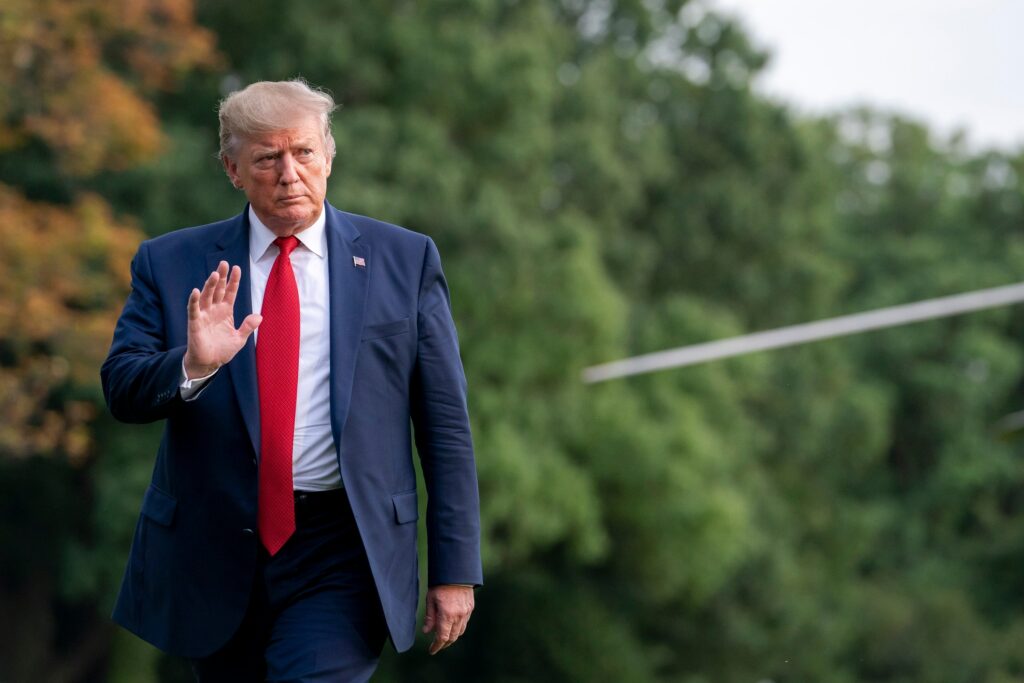President Donald Trump has ruled out a third run for the U.S. presidency, stating clearly in a recent interview that he intends to honor the traditional two-term limit. His comments come amid growing speculation fueled by campaign-style messaging and merchandise promoting a “Trump 2028” slogan.
In a nationally televised conversation on NBC’s Meet the Press, Trump addressed the rumors directly.
“I’ll complete eight years in office as a two-term president. That principle has always mattered to me,” he said during the interview.
Trump, now 78, added that earlier comments about seeking a third or fourth term were made “to provoke the media.” Those earlier remarks had led to confusion and concern over his long-term political intentions.
Trump Clarifies Remarks on Future Candidacy
The interview was conducted Friday at Trump’s Mar-a-Lago residence in Florida. During the discussion, he revealed that he regularly receives messages urging him to remain in office.
“Many people are encouraging me to stay,” Trump noted, just after reaching the 100-day mark of his second term.
However, he also acknowledged the constitutional boundaries of presidential service.
“As far as I know, running for a third term isn’t permitted. Whether that’s constitutional or not, I can’t say,” he said.
Despite Trump’s denial, his political organization has released branded merchandise labeled “Trump 2028.” The move has sparked further debate about whether his inner circle may be testing the waters for a potential constitutional challenge.
Legal Scrutiny Over Immigration Actions
The president also faced tough questions during the interview about his approach to immigration enforcement. NBC’s Kristen Welker questioned whether his administration respects constitutional protections, especially due process rights under the Fifth Amendment.
Critics have argued that recent deportation actions have violated legal safeguards. These include the removal of individuals without formal charges or access to immigration court hearings.
“Isn’t upholding the Constitution your duty as president?” Welker asked.
Trump replied that legal questions are handled by his advisors.
“I rely on my brilliant legal team, and they follow the rulings of the Supreme Court,” he said.
In April, the U.S. Supreme Court ordered the government to assist in the return of a Salvadoran national who was wrongly deported. The Trump administration had argued that it could not force El Salvador to repatriate the man.
Military Options on Greenland, But Not Canada
Trump also weighed in on international relations, addressing past reports that he considered purchasing Greenland from Denmark. He did not completely reject the idea of using military power in that context but made clear that such a scenario would not apply to Canada.
“I don’t think that’s a possibility with Canada,” Trump said, after the country’s latest elections resulted in a victory for Liberal Party leader Mark Carney.
He added:
“They assume we’ll always protect them—and we will. But they don’t contribute enough to mutual defense. That’s unfair to American taxpayers.”
Carney is expected to visit the White House for a diplomatic meeting on Tuesday.
Emergency Powers Still in Effect at the Border
Another topic of discussion was the ongoing immigration emergency declared by Trump on his first day of the new term. Despite historically low numbers of illegal border crossings, the declaration remains active.
“Our border is more secure than ever,” Trump said.
When asked why the emergency powers are still necessary, the president pointed to what he described as a “court crisis.”
“The actual emergency is that we have thousands we need to remove, but some judges insist on court hearings,” he said.
He emphasized that the current legal and administrative structure is overwhelmed and signaled no intent to end the emergency order.
Although President Trump says he has no plans to seek a third term, the conversation around the issue is likely to continue, especially as political merchandise and internal GOP chatter hint at possible constitutional reinterpretation.
Legal scholars note that the 22nd Amendment of the U.S. Constitution clearly limits presidents to two terms, but no formal court challenge has ever tested a third-term candidacy.
For now, Trump appears to be staying within the constitutional guardrails, while still leveraging public sentiment and media interest in his political longevity.
